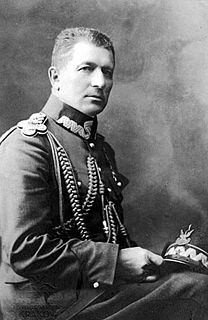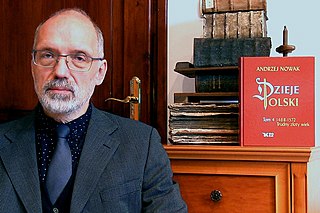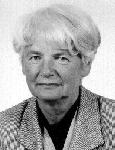
Władysław Bartoszewski was a Polish politician, social activist, journalist, writer and historian. A former Auschwitz concentration camp prisoner, he was a World War II resistance fighter as part of the Polish underground and participated in the Warsaw Uprising. After the war he was persecuted and imprisoned by the communist Polish People's Republic due to his membership in the Home Army and opposition activity.

Kazimierz Klaudiusz Górski was a coach of Poland national football team and honorary president of the Polish Football Association. He was also a football player, capped once for Poland.

Franciszek Żwirko [english pronunciation like: frantsishek zhvirko] was a prominent Polish sport and military aviator. Along with Stanisław Wigura, he won the international air contest Challenge 1932.

Edward Franciszek Szczepanik was a Polish economist and the last Prime Minister of the Polish Government in Exile.

Tadeusz Żenczykowski, pseudonym Kania, Kowalik and Zawadzki was a Polish lawyer, political activist and soldier in the Armia Krajowa during World War II, taking part in the Warsaw Uprising of 1944. Immediately after the war, he was a member of the anti-communist conspiracy in Poland. In 1945, he emigrated and became a journalist and deputy chief of the Polish Section of Radio Free Europe, historian and publicist.

Franciszek Ksawery Latinik was a Polish military officer, Colonel of Austro-Hungarian Army and Major General of the Polish Army.

Andrzej Nowak is a Polish historian and opinion journalist.

Andrzej Bobola Czuma(listen) is a Polish politician, lawyer and historian. He was an activist of the Polish anti-Communist opposition in the Polish People's Republic and was oppressed and imprisoned by the Communist authorities. In the 1980s he left for the USA where he became an activist in the community of Polish expats. Since 2006, Czuma has been a member of the Polish Parliament as a representative of the Civic Platform political party.

Franciszek Wawrzyniec Kamiński, pseudonym: „Olsza”, „Kowal”, „Zenon Trawiński” was a Polish politician and military leader, commander of the Peasant Battalions during World War II. After war he was a member of the State National Council and the Legislative Sejm. Imprisoned for political reasons during the Stalinist period.

Bronisław Pawlik was a Polish actor. He starred in the TV series Stawka większa niż życie and 1978 comedy film What Will You Do When You Catch Me?. At the 1st Moscow International Film Festival (1959) he won a Silver Medal for acting for his role in the film The Eagle.

Wojciech Juliusz Siemion was a Polish stage and film actor. He studied law at the Catholic University in Lublin from 1947 to 1950. At the same time, he attended acting classes at a local theatre. He enrolled at the State Theatre Academy in Warsaw and after just one month, was able to skip two years of studies. Upon graduation in 1951 he began acting in several theatres and cabarets including Pod Egidą. In 1983, he became a member of the council of the Patriotic Movement for National Rebirth, and in 1985–1989 served as a member of the Sejm from the Polish United Workers' Party. After the fall of the communist regime in Poland, Siemion became a member of the Polish People's Party and served in the regional legislature of the Masovian Voivodeship. Siemion was awarded many cultural and state awards, including the Order of Polonia Restituta.

Zbigniew Dionizy Ścibor-Rylski was a Polish brigadier general and aviator who was a participant of the Warsaw Uprising during the World War II. As a Polish Air Force officer, he fought alongside the resistance movement starting in 1940 and rose through the ranks of Armia Krajowa.

Tadeusz Czesław Malinowski was a Polish scientist and archaeologist specialising in the Bronze Age and early Iron Age.
Jan Berek (1896–1986) was a soldier of the Austro-Hungarian Army and Generał brygady of the Polish Army, who fought in World War I, Polish–Soviet War and the Invasion of Poland.
Janusz Andrzej Rieger is a Polish linguist and slavist specializing in the history of Polish language in Kresy, professor of the humanities, member of the Warsaw Scientific Society. He worked at the Institute of Slavic Studies and at the Institute of Polish Language of the Polish Academy of Sciences, and lectured at the University of Warsaw.

Rachela Hutner was a pioneering Polish nurse who was instrumental in the development of the post-World War II nursing profession of her country, pressing for educational requirements and standards. She received numerous awards and honors, including the Knight's Cross and Commander's Cross with the Star of the Order of Polonia Restituta from Poland and the international Florence Nightingale Medal.

Zofia Kuratowska was a Polish doctor, politician, and diplomat of Jewish descent. Her father, Kazimierz Kuratowski, was a mathematician who worked at the Warsaw School of Mathematics. Kuratowska took part in the Warsaw Uprising during World War II. After the war ended, she graduated from the Medical University of Warsaw with a specialty in hematology, and became a doctor. In the 1980s she joined the Solidarity movement and became one of their healthcare workers.
Bohdan Dobrzański was a Polish soil scientist, agrophysicist, agronomist, academic, and professor at several Warsaw- and Lublin-based universities. As the Rector of the Lublin Higher School of Agriculture, he led the formation of the first Chair of Soil Science in Poland. Dobrzański was a pioneer of agrophysics in Poland, a founder and long-time director of the Institute of Agrophysics in Lublin, and the Polish Journal of Soil Science. He is a co-author of the official Table of Land Classes and criteria for valorisation of agricultural production areas. He was awarded a number of prizes and medals including The Commander's Cross of the Order of Polonia Restituta.

Artur Antoni Dmochowski is a Polish journalist, historian, and diplomat; ambassador to Montenegro.

Adam Franciszek Józef Siedlecki or Adam Grzymała-Siedlecki (AGS) (1876–1967) was a Polish literary and theater critic, playwright, translator, prose writer and director.
















